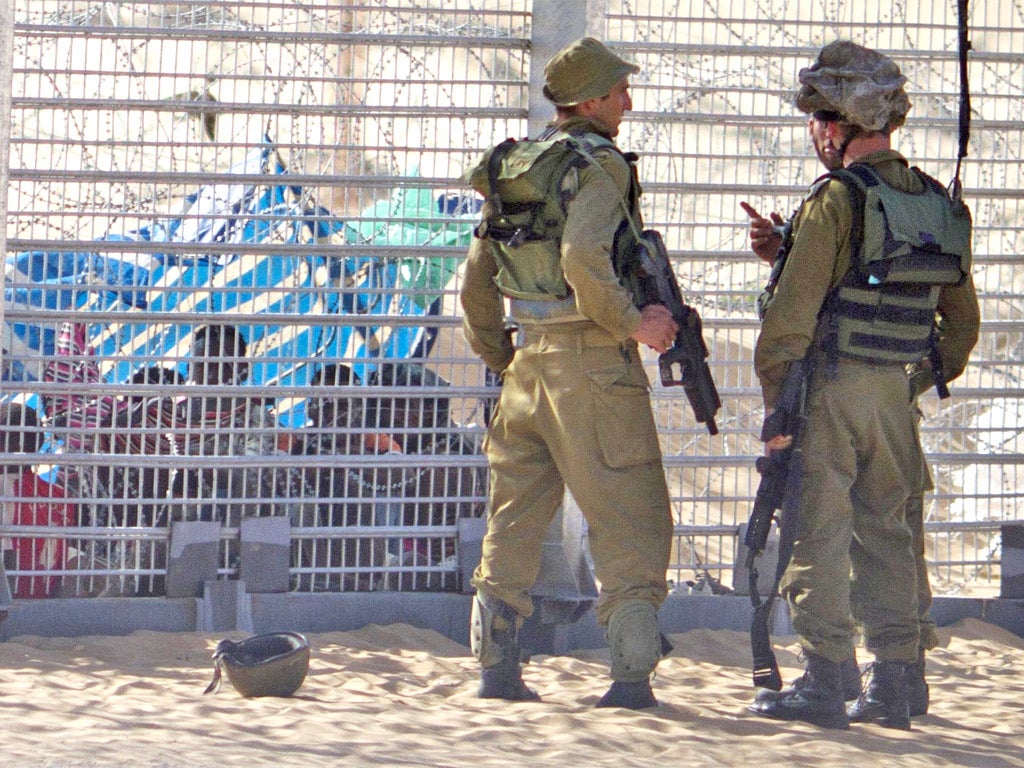Israel urged to help Eritrean refugees stuck at desert border
Medics sending team to border fence amid claims migrants were left for six days with no food

Volunteer medics will travel to the Israel border with Egypt this morning in an attempt to persuade the Israeli authorities to allow in up to 20 Eritrean migrants who they say have been stranded in blistering desert heat for six days without food.
The Eritreans, said to include two women and a teenager, have bunched under a makeshift plastic sun visor, on the far side of the new border fence built by Israel as part of its now toughened policy of preventing African migrants from entering its territory. Israel's military, which says it is passing water to the asylum seekers through the fence, has sealed off the area and activists who tried to reach the area on Tuesday to bring them food say were stopped from meeting the migrants. They did, however, say the troops had promised to pass on the food.
Eli Yishai, Israel's Interior minister, who has taken a tough line on migrants, insisting on a round-up of mainly Sudanese and Eritrean entrants, said in an Army Radio interview that "it is hardest for me of everyone to see these pictures [of the stranded migrants]" but made it clear he did not intend to allow them in. "If there were no fence there, and we were not determined, then that number would become 1 million people," he said.
The fence is part of a nearly completed 125-mile border barrier intended to keep African migrants out, and also to protect Israel from militants from the Sinai desert launching cross-border attacks.
Physicians for Human Rights-Israel (PHR), which is sending a delegation to the border today, said: "As doctors and human rights advocates, we cannot stand idly by. We call upon the State of Israel to uphold basic human dignity and to act according to its legal obligations by allowing the asylum seekers refuge and protection in Israel". PHR also pointed out that there had been "numerous cases" in its refugee medical clinic of asylum seekers who had undergone "torture, abuse and rape" on their way through the Sinai desert to Israel, and that many also feared for their safety if handed over to the Egyptian authorities.
Israel has embarked on a tough new policy, including detentions, designed to stem the flow across the Egyptian border of African migrants – around 70,000 of whom are believed to be in the country – which accelerated after 20 Sudanese asylum seekers were killed during a 2005 demonstration in Cairo.
The authorities this year began deporting South Sudanese migrants on the grounds that the new country was safe enough to return to. But those from Sudan itself cannot be sent back to their home countries under international conventions because of their bad human rights records, which in Eritrea includes long-term enforced military service.
Associated Press yesterday quoted an unnamed Israeli official as saying that no "international body" had determined that Sudanese or Eritreans would be persecuted in Egypt and that Israel had "no legal obligation" to let them in. But William Tall, the representative in Israel of the UN refugee agency UNHCR, said Israel should allow the group to enter and examine their claims to be genuine refugees.
"These people are expressing a fear to be returned," said Mr Tall. "They [Israel] can't deny them access to [its] territory."
Peace hopes are fading, warn Palestinians
Palestinian leaders have issued their gravest warning yet that the prospects for peace between Israel and a new state of Palestine are fast diminishing.
The PLO Executive Committee, the highest Palestinian decision-making body, said after meeting in Ramallah that diplomacy has "entered an unprecedented dangerous phase that threatens, in a new way and in the near future, the two-state solution".
Officials said Israel's emphasis on peace talks to solve the outstanding issues was a "cover- up" for increased settlement activity in the West Bank. Hanan Ashrawi, of the PLO committee, accused Israel of being "in a mad race against time to... destroy the two-state solution". But Mark Regev, an Israeli spokesman, said: "The reason for the impasse in the peace process is the Palestinian decision to boycott peace negotiations."
Matthew Kalman
Join our commenting forum
Join thought-provoking conversations, follow other Independent readers and see their replies
Comments
Bookmark popover
Removed from bookmarks